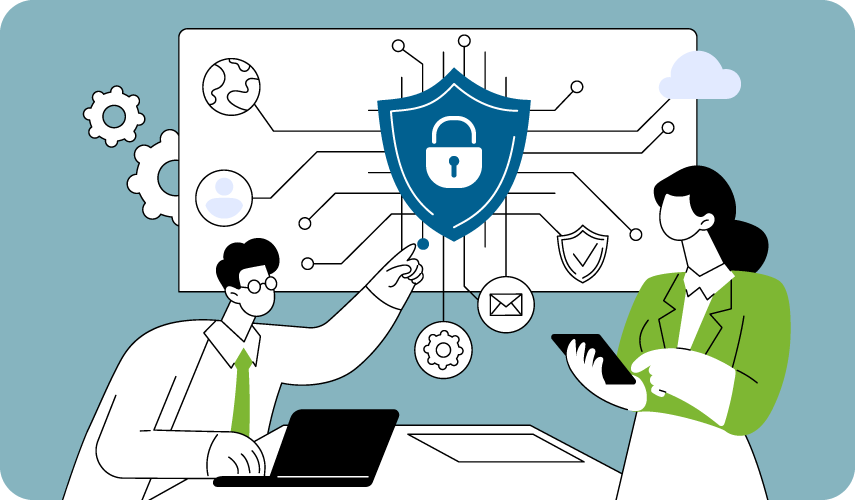
Thought Leadership
Cybersecurity Blind Spots: Questions Every College President Should be Asking
As colleges and universities digitize operations—from student records and payroll systems to learning platforms and administrative workflows—they become increasingly vulnerable to sophisticated cyber threats. While many colleges have basic protections in place, executive leadership—especially college presidents—must take a more active role in identifying and addressing overlooked vulnerabilities.
Here are key questions every college president should be asking to ensure their institution is not exposed to preventable risks.
- Are Employees Truly Cyber-Aware?
Annual information security awareness training is essential—a human element played a role in 60% of all breaches observed last year in Verizon’s 2025 Data Breach Investigations Report (DBIR)—but it’s only effective if participation is enforced.
- Are there consequences for failing to complete training or remedial actions for employees who fall for phishing tests?
Without accountability, training loses its impact.
- Is Your Fraud Prevention Strategy Up to Date?
Fraud schemes often target procurement and payroll systems. Organizations that did not provide fraud awareness training lost nearly 2x more than organizations that do train their staff about fraud, according to the Association of Certified Fraud Examiners’ (ACFE) Occupational Fraud 2024: A Report to the Nations.
- Have you reviewed office procedures for updating sensitive financial information like account numbers, addresses, and contact details?
A single lapse can lead to significant financial loss.
- Can You Trust Identity Verification Processes?
Cybercriminals frequently exploit weak identity verification protocols. For example, the FBI and Multi-State Information Sharing & Analysis Center (MS-ISAC) warn of a growing cyber threat where attackers compromise vendor accounts in government and educational institution portals to redirect payments, often resulting in multi-million-dollar losses. These relatively simple but increasingly frequent schemes exploit authentication weaknesses and portal workflows, underscoring the urgent need for stronger security measures and cross-team collaboration.
- Are there robust processes in place to confirm the identity of individuals requesting changes to account-related information—especially for payroll, financial aid, computer access, and vendor accounts?
Without strong verification protocols, your data is at increased risk.
- Are Elevated Privileges Properly Protected?
Accounts with elevated privileges are prime targets, according to Sprinto—up to 66% of all phishing attempts are against privileged accounts like those held by administrative or finance positions.
- Are protections like Multi-Factor Authentication (MFA), remote access restrictions, and encryption consistently applied?
These safeguards are critical to preventing unauthorized access.
- Are You Compliant with Federal Regulations?
Higher education institutions must comply with federal regulations such as the Gramm-Leach-Bliley Act (GLBA) and the FTC’s Red Flags Rule.
- Have you reviewed your compliance posture recently?
Non-compliance can result in penalties and reputational damage.
- Are Your Backups Ransomware-Resilient?
Ransomware attacks are on the rise. Verizon’s 2025 DBIR suggests that breaches can be ransomware-related 88% of the time. In the first half of 2025, ransomware attacks across the education sector surged by 23% compared to the previous year—and average ransom demands exceed $550,000.
- How confident are you that your backups of critical data are secure, accessible, and capable of restoring operations quickly?
Backup integrity is a cornerstone of institutional resilience, and The State of Ransomware in Education 2025 report by Sophos indicated nearly 53% of higher education institutions affected by ransomware were unable to restore their data from backups.
- Do You Have AI Usage Guidelines?
Artificial Intelligence (AI) is transforming higher education, but it also introduces new risks.
- Do you have clear guidelines on the use of AI technologies and the protection of sensitive institutional data?
Without them, you may be exposing your institution to unintended consequences.
- Are You Prepared for a Security Incident or Disaster?
Security incidents and disasters can strike any institution unexpectedly. Whether caused by cyber threats, natural disasters, or other emergencies, the impact can be significant—affecting operations, reputation, and the safety of stakeholders.
- Is your institution ready to respond quickly and effectively to a security incident or disaster?
Assessing your institution’s preparedness and periodically validating through tests or drills is critical to minimize risks and ensure a swift recovery.
Partnering for a Secure Future
Cybersecurity is no longer just an IT concern—it’s a strategic leadership priority. By asking the right questions, enforcing accountability, and fostering a culture of vigilance, you can play a pivotal role in protecting your institution from evolving threats.
CampusWorks is Here to Help
As part of our comprehensive IT Managed Services, we provide tailored cybersecurity solutions that safeguard sensitive data, ensure regulatory compliance, and strengthen institutional resilience. Let us help you turn awareness into action—and secure your institution’s future by maturing your information security posture to identify, mitigate, and lower risk.
Let’s Get Back To Happy
Contact us for more information, more understanding, and more days that run smoothly.


